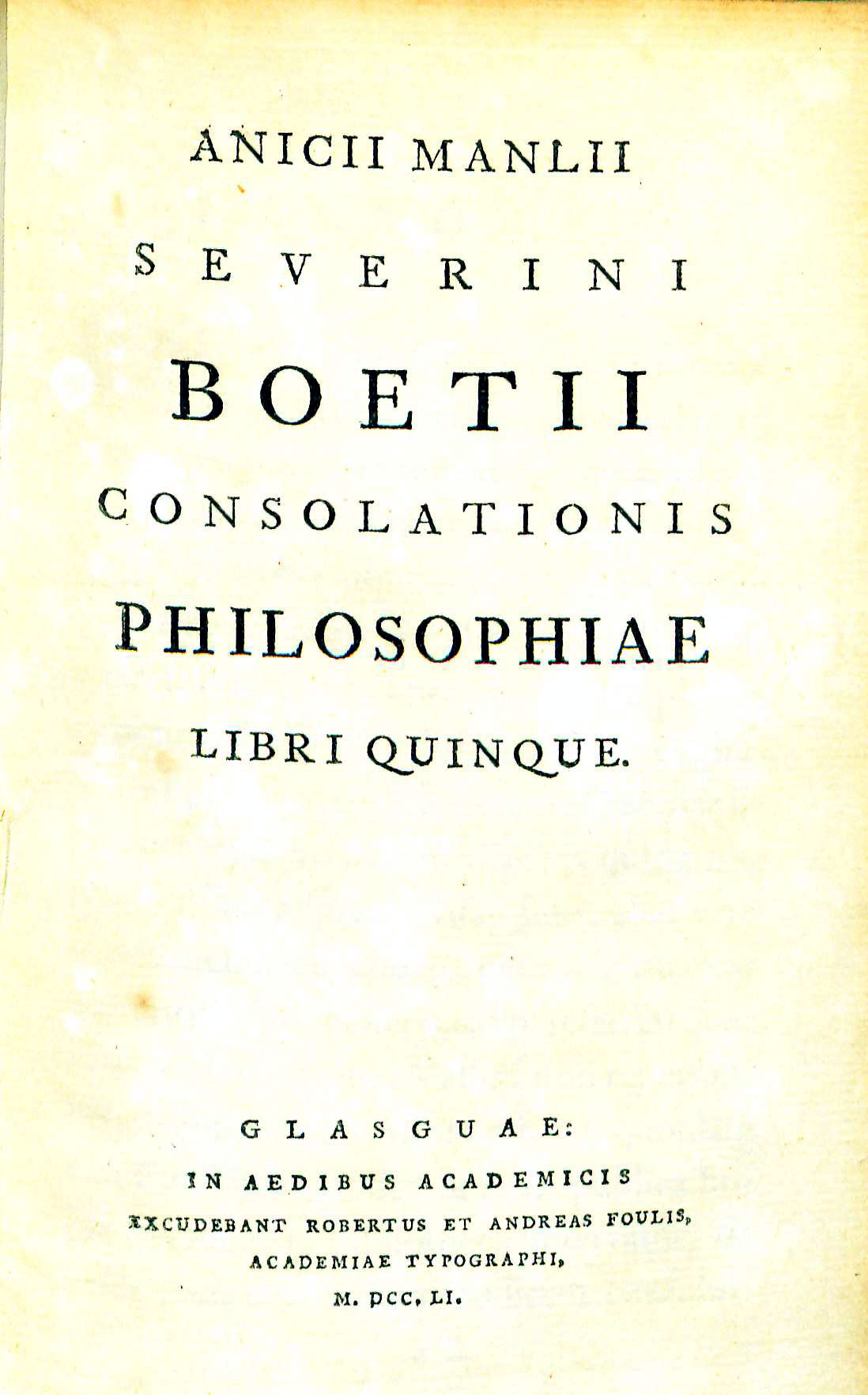Anicii Manlii Severini Boetii Consolationis Philosophiae Libri Quinque
by Boethius
| Consolationis Philosophiae | |
|
Title page from Consolationis Philosophiae, George Wythe Collection, Wolf Law Library, College of William & Mary. | |
| Author | Boethius |
| Published | Glasguae: In Aedibus Academicis excudebant Robertus et Andreas Foulis academiae typographi |
| Date | 1751 |
| Edition | First Foulis edition |
| Language | Latin |
| Pages | 157 |
| Desc. | 12mo (16 cm.) |
| Location | Shelf A-4 |
Anicius Manlius Severinus Boethius, known as Boethius (ca. 480-ca.525), was a Christian Neoplatonist philosopher who served as consul in the kingdom of the Ostrogoths. He later held the office of magister officiorum to the Gothic emperor Theoderic in Italy before his execution for alleged disloyalty.[1] Boethius’ knowledge of Greek, rare for his time, allowed him to translate and comment upon the works of Platonism. He translated the works of the Neoplatonist Porphyry and wrote treatises that heavily influenced medieval scholasticism.[2] His translations provided all the extant works of Aristotle before their recovery in the twelfth century.[3]
Boethius wrote Consolationis Philosophiae (the Consolation of Philosophy), “a favored book of world-weary readers from Alfred the Great to Elizabeth I,” while imprisoned awaiting his death.[4] Written as a Menippean satire — a prose narrative mixed with verse — the work presents Boethius in dialogue with philosophy personified as a woman. He moves from self-pity to consolation while contemplating divine providence throughout life’s “wheel of fortune,” a metaphor Boethius created.[5] First translated into English in 890 by King Alfred, the Consolation had great influence on subsequent literature, including medieval moral narrative and Chaucer.[6] Specifically, Chaucer translated the Consolation into Middle English, and drew heavily on Boethius’ concepts of patience and steadfastness in the face of wavering fortune.[7]
Evidence for Inclusion in Wythe's Library
Listed in the Jefferson Inventory of Wythe's Library as "Boethius de Consolationes. 12mo. Foulis." This was one of the titles kept by Thomas Jefferson. He most likely sold it to the Library of Congress in 1815. In Catalogue of the Library of Thomas Jefferson, Millicent Sowerby identifies an existing copy of the 1752 edition published by Foulis as the one Jefferson sold, but it includes no Jefferson or Wythe markings.[8] Nevertheless, both George Wythe's Library[9] on LibraryThing and the Brown Bibliography[10] list this volume based on Sowerby's information. This was also the edition purchased by the Wolf Law Library.
Description of the Wolf Law Library's copy
Bound in contemporary full vellum.
Images of the library's copy of this book are available on Flickr. View the record for this book in William & Mary's online catalog.
See also
References
- ↑ Late Antiquity: A Guide to the Postclassical World, s.v. "Boethius," accessed October 02, 2013.
- ↑ Encyclopedia of Medieval Literature, s.v. "BOETHIUS (c. 480-525)," accessed October 02, 2013.
- ↑ Ibid.
- ↑ Late Antiquity: A Guide to the Post Classical World.
- ↑ Ibid.
- ↑ Encyclopedia of Medieval Literature.
- ↑ All Things Chaucer: An Encyclopedia of Chaucer's World, s.v. "Boethius," accessed October 02, 2013.
- ↑ E. Millicent Sowerby, Catalogue of the Library of Thomas Jefferson (Washington, D.C.: The Library of Congress, 1952-1959), 2:39 [no.1326].
- ↑ LibraryThing, s. v. "Member: George Wythe", accessed November 11, 2013.
- ↑ Bennie Brown, "The Library of George Wythe of Williamsburg and Richmond," (unpublished manuscript, May, 2012) Microsoft Word file. Earlier edition available at: https://digitalarchive.wm.edu/handle/10288/13433
External Links
Read this book in Google Books.
